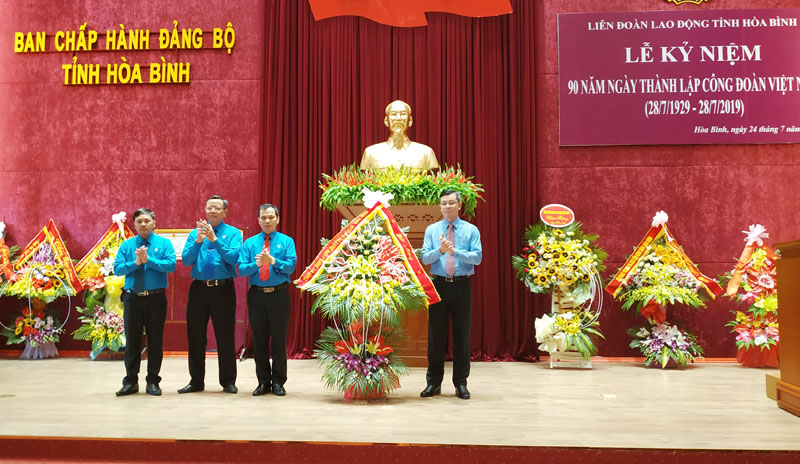
(HBO) – The Confederation of Labour of Hoa Binh province on July 24 organised a ceremony to mark the 90th founding anniversary of Vietnam’s Trade Union (July 28, 1929-2019).
 Vice Secretary of the provincial
Party Committee Ngo Van Tuan presents flowers of provincial Party Committee,
People’s Council, People’s Committee and Fatherland Front Committee to Confederation
of Labour staff.
Vice Secretary of the provincial
Party Committee Ngo Van Tuan presents flowers of provincial Party Committee,
People’s Council, People’s Committee and Fatherland Front Committee to Confederation
of Labour staff.
At the event,
delegates recalled the 90-year tradition of the Vietnamese Trade Union. Hoa
Binh province’s Labour Confederation Executive Board was founded in October
1991, comprising eight members, with Vu Quang Du serving as its President.
Since its inception, the confederation has organised 16 congresses and gained
remarkable achievements. The provincial confederation currently includes 11 confederations
at the city and district levels, seven organisations of different sectors with
1,248 grassroots trade unions and 62,422 members. In the 2013-2018 tenure,
all-level trade unions have mobilised over 10 billion VND for different funds,
presented gifts worth 11.3 billion VND to poor trade union members, and mobilised
1.5 billion VND to build houses for 74 underprivileged trade union members.
Speaking at the event,
Vice Secretary of the provincial Party Committee Ngo Van Tuan and Trinh Thanh
Hang, member of the Presidium, head of the department for woman affairs of the
Vietnam General Confederation of Labour, praised achievements gained by the
province’s all-level trade unions over the past years, thus contributing to
boosting local socio-economic development and ensuring defence security.
To successfully
implement the 16th provincial Party Congress’s resolution, Tuan asked local
trade unions to continue stepping up disseminations on the Party’s policies and
the State’s and the province’s regulations, pay more attention to make the
worker class a key and pioneer force in the national renewal, modernisation and
industrialisation cause.
It is necessary to renew
organisation and operation methods with a target of putting labourers at the
centre, create favourable conditions for workers and labourers to take the
initiative in production and business, and build a harmonious, stable and
progressive relationship in enterprises, he stated.
He also emphasised the
need to attract more trade union members, establish more grassroots trade
unions and pay attention to opinions and aspirations of labourers.
The Standing Board of the Hoa Binh provincial Party Committee has agreed in principle on a proposal by the Standing Board of the Party Committee of Hoa Binh city to gather feedback on the city’s 1:2000 zoning plan, which forms part of its broader urban development strategy.
Hoa Binh province has made notable progress in public administration reform and digital government development, with the satisfaction index among citizens and businesses reaching over 84%, according to recent government evaluations.
Thanks to great efforts by local authorities in recent times, the governance and public administration performance of Mai Chau district has been significantly improved.
In the afternoon of June 6, the Party Committee, the People's Council, the People's Committee and the Fatherland Front of Lac Son district solemnly held a meeting to celebrate the 139th anniversary of the district's founding (1886–2025) and the 79th anniversary of the establishment of the district's Party Committee (1946–2025). There was the attendance of Mr. Bui Van Thang, the Vice Chairman of the Provincial People's Council; Mr. Quach Tat Liem, the Vice Chairman of the Provincial People's Committee; Ms. Dang Bich Ngoc, the Deputy Head of the National Assembly Delegation of the province; as well as the former leaders of the province and district through various periods, who are the natives of the district.
Implementing the Politburo’s Resolution No. 57-NQ/TW on breakthroughs in science – technology, innovation, and digital transformation is a golden opportunity for the northern mountainous province of Hoa Binh to renew growth model, improve competitive edge and shorten digital gap.
Resolution 57-NQ/TW, issued by the Politburo on December 22, 2024, identifies sci-tech, innovation, and digital transformation as strategic breakthroughs to build a developed and prosperous nation. In Hoa Binh province, this spirit is not just a slogan, it’s being put into action through concrete initiatives that form a "new development triangle”: digital citizenship, digital economy, and digital administration.



 Vice Secretary of the provincial
Party Committee Ngo Van Tuan presents flowers of provincial Party Committee,
People’s Council, People’s Committee and Fatherland Front Committee to Confederation
of Labour staff.
Vice Secretary of the provincial
Party Committee Ngo Van Tuan presents flowers of provincial Party Committee,
People’s Council, People’s Committee and Fatherland Front Committee to Confederation
of Labour staff.